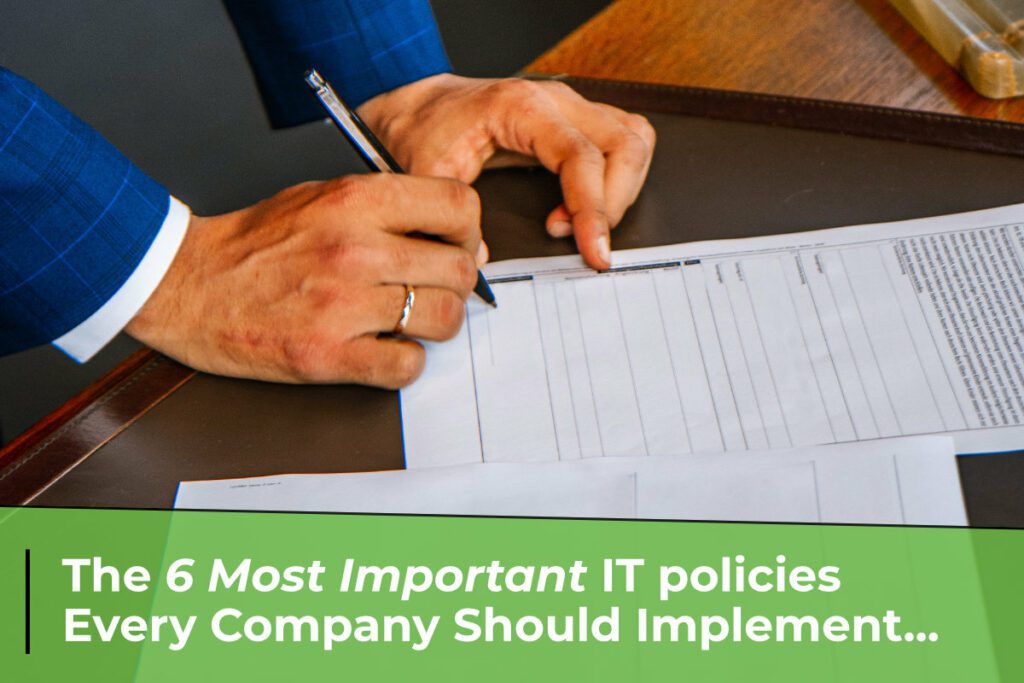A common mistake made by small businesses is to skip policies. They believe things shouldn’t be so formal. When a problem arises, they’ll simply inform staff what’s expected.
This way of thinking can cause issues for small and mid-sized businesses. Employees do not read minds. They might not see things as obvious as you do.
Should a problem arise, not having policies can also leave you in a poor legal position. For example, a lawsuit arising from misuse of a company device or email account.
According to a recent study, 77% of employees access their personal social media while at work. In addition, 19% of them spend one full working hour a day on social media. In some instances, employees are ignoring a company policy. In other cases, there is no specific policy to follow.
Technology management and IT policies are integral parts of IT security. Therefore, you should have them regardless of the size of your business. This article will introduce you to some of the most important IT policies your company should have in place.
Are these IT policies in place at your company?
Secure Password Policy
It is estimated that 77% of all cloud data breaches are caused by compromised passwords. Globally, compromised credentials now account for the majority of data breaches.
Your password security policy lays out how passwords should be handled by your team. Things to include are:
- How long passwords should be
- Making a strong password (e.g., using a number and a symbol).
- The best place to store passwords
- Using multi-factor authentication (if needed)
- When should passwords be changed
Acceptable Use Policy (AUP)
This policy is an overarching document. The document explains how your organization can effectively use technology and data. The policy will govern things like device security. It may be necessary for employees to keep their devices updated, for example. This policy should include that if this is the case.
Your AUP should also include where it is acceptable to use company devices. Remote employees may also be prohibited from sharing work devices with family members.
AUPs also include data protection. It should specify how data should be stored and handled. In order to ensure security, the policy might require an encrypted environment.
Cloud & App Use Policy
Employees are increasingly using unauthorized cloud applications. A company’s cloud usage is estimated to be 30% to 60% influenced by “shadow IT.”
Most employees use cloud apps on their own because they don’t know any better. They don’t realize how dangerous it is to use unapproved cloud tools to store company data.
Employees will be told which cloud and mobile apps may be used for business data through a cloud and app use policy. Unapproved applications should be restricted. Furthermore, it should provide a way for users to suggest productivity-enhancing apps.
Bring Your Own Device (BYOD) Policy
A BYOD approach is used by approximately 83% of companies for employee mobile devices. It saves companies money to allow employees to use their own smartphones at work. As a result, employees don’t have to carry around two devices.
BYOD can have security and other issues if you don’t have a policy dictating its use. If the operating system on employee devices isn’t updated, they may be vulnerable to attack. Compensation for the use of personal devices at work can also be confusing.
Using employee devices for business is clarified in the BYOD policy. This includes the security requirements for those devices. It may also mention the need to install an endpoint management app. In addition, it should cover compensation for personal devices used for business purposes.
Wi-Fi Use Policy
When it comes to cybersecurity, public Wi-Fi is a problem. According to 61% of surveyed companies, employees use company-owned devices to connect to public Wi-Fi.
Logging into a company app or email account is something most employees do without thinking twice. Regardless of whether the connection is public or private. In this case, your company’s credentials might be exposed and your network compromised.
Your Wi-Fi use policy will explain how employees can ensure safe connections. It may require the use of a company VPN. Depending on your policy, employees may also be restricted from doing certain activities when using public Wi-Fi, not entering passwords or payment card details into a form for example.
Social Media Use Policy
Social media use at work is so common that it’s important to address it. In this case, endless scrolling and posting could steal hours of productivity each week.
- Your social media policy should include details such as:
- Limiting employee access to personal social media
- Limiting the types of posts employees can make about the company
- Identifying “safe selfie zones” and areas that are not acceptable for public images
Get Help Improving Your IT Policy Documentation & Security
We can assist your organization in addressing IT policy deficiencies and security issues. Get started by scheduling a consultation today.

